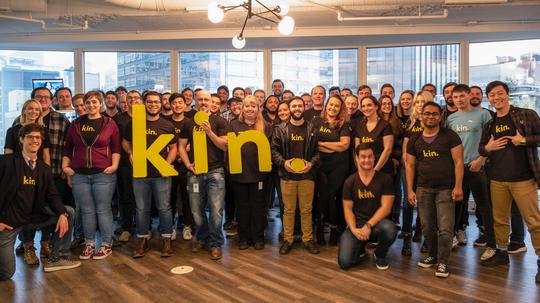
When Chicago startup Kin first arrived on the scene, it garnered attention for being a home insurance company that built its software entirely from scratch.
That meant creating a platform that allowed them to make underwriting decisions quickly based on data from satellite images, public records and other sources, many of which traditional insurance companies weren’t using. As a result, Kin made a home insurance business that operates more efficiently, but is also cheaper for customers.
“There are lots and lots of customers that are looking to buy home insurance in the same way they get a credit card,” said Kin Co-Founder and CEO Sean Harper. “They expect a simple, streamlined process.”
In 2016, Kin was just getting itself off the ground in Chicago, a city that has become somewhat of an insuretech hub. Since then, Harper has led the company through some of its most notable growth milestones so far.
“A lot of stuff has changed,” he said.
In the first half of 2018, Kin was growing 50 percent month over month, building up a customer base across four states that now tops 12,000.
“We found that the markets we’re most interested in are the ones where the weather gets really bad,” Harper said.
Right now, that mainly means states that experience hurricanes. Kin currently operates in Florida, Texas, Alabama and Georgia. But it plans to be in six more states by the end of the year, including ones like California that experience wildfires and mud slides.
All of Kin's growth at the beginning of last year allowed the startup to attract the attention of investors and raise $12 million in venture capital funding. The startup now has $16.5 million in total VC funding, Harper said, adding that it has mainly helped Kin hire more people.
The startup now has 60 employees, and Kin has plucked a significant portion of them from the insurance industry.
“We call them our insurance misfits,” Harper said.
One of them, Greg Meyers, who was previously the COO at AAA subsidiary CSAA Insurance Group, is now Kin’s chief insurance officer. Other employees have come from Ameriprise Financial and Allstate.
To accommodate its growing staff, Kin has moved offices twice in the last couple years as it outgrew co-working offices. At the beginning of this year, Kin moved into its own office in the Loop.
As the startup has settled into the new space, Harper has focused on making it theirs, adding culture elements that help attract and retain talent.
“It’s a pretty fun office,” Harper said.
Kin’s space is decorated with “weird” and “quirky” art made by the staff, and conference rooms are named after insurance terms, like “accidental death and dismemberment.” Additionally, Harper said the staff makes Kin puns whenever possible, resulting in the office’s interns being referred to as “Kinterns.”
The most unique office tradition of them all, though, is Harper and Kin’s CTO Lucas Ward making breakfast in the office for the entire staff once a month.
“I like to make pancakes, and Lucas makes hash browns and eggs,” Harper said.
But other than making pancakes, Harper said he's focused on raising another round of funding for Kin that’s expected to close this summer. He’s also working with state regulators as Kin looks to expand into new regions, and strategizing on how Kin can launch new types of home coverage in the future, like flood insurance.
“We think there’s huge potential there,” Harper said. “If we just keep doing what we’re doing, we’ll continue growing.”








